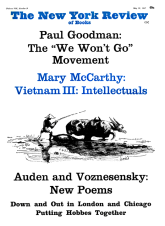In response to:
The One That Got Away from the February 9, 1967 issue
To the Editors:
Expecting philosophy to do a certain task which he finds that it never really does, Professor Hexter has used Professor White’s book and mine as the occasion to vent a punitive frustration against an entire philosophical enterprise, rather than as the occasion to review the appropriateness of unsatisfied expectations [NYR, March 23]. He explains the “rather acrid tone” of his review as the consequence of his “patient impatience with the radically imperceptive views on history with which [White] has associated himself,” adding that “Of the group of philosophers who share these views, he alone has also been an accomplished practicing historian, so that one might have expected him to know better.” But no amount of historical competence especially qualifies a man to do philosophy of history, for the latter is an exercise of philosophical, not historical techniques. What Hexter evidently wants, as appears from his flattering invitation to White and me to concentrate our “keen minds and magnificent technical equipment to finding out how historians actually succeed….” is some sort of exact composite portrait of the working historian. But this cannot be asked of philosophy which, when concerned at all with history, is so in terms of the illumination which the latter may bring upon the most general features of that conceptual scheme which it is the chief task of philosophy to analyze. It is the location of history in the general conceptual economy which alone makes it of the least philosophical interest, however otherwise interesting it may be.
Consider thus the first several chapters of my book, in which I confront certain skeptical impediments to the achievement of what I consider the “minimal historical aim,” namely, to make true statements about the past. It did not occur to me that anyone would have thought I was trying to get down the lasting likeness of the historian’s logical physiognomy here: I only was specifying an exceedingly minimal condition, satisfaction of which must be presupposed by any further cognitive ambitions historians must have. Rebutting these skepticisms would be roughly as relevant to the description of history as demonstrating the existence of material objects would be to physics. But I was attempting nothing like a description of “how historians actually succeed” but rather an analysis of cognitive success as such. As a portrait, mine would have been laughably inept. But it was no more that than a map is a sous-bois. It rather was concerned with a complex of philosophical questions having to do with time, tense, meaning, reference, inference, existence, evidence, and truth.
Much the same must be said concerning the so-called problem of historical explanation. Hempel’s classical 1942 paper was an attempt, not to portray history, but rather to show that a well-known theory of explaining events—a theory (roughly) that we explain an event by showing it to instantiate a law—is not, contrary to a prevailing philosophical opinion, subject either to rejection or revision when the event in question happened to be an historical event. Save relative to the background theory, Hempel’s paper can scarcely be appreciated, and the same, I think, must be said of the entire literature grown up around that problem, including Professor White’s book. There, if I may speak for him, he was interested primarily in the concept of explanation, and in historical explanation only in so far as it bears upon the general logical character of explanation as such.
In a review of my book, Michael Scriven writes: “It is of course becoming clear that analytical philosophy of history is a fairly complex technical field, and that the reflections of even the best historians on the nature of their activity are no longer very enlightening unless they are familiar with some of the logical discussion.” Had Professor Hexter approached the philosophical thought of the present with the intelligence and dispassion he almost certainly would have demanded of himself were he examining the philosophical thought of the sixteenth century, he could not have sustained the vexations which led him to write a review so vagrant and irrelevant. Tout esprit n’est pas composé d’une étoffel Qui se trouve taillée à faire un philosophe declares Henriette in Les Femmes Savantes. But one would expect from an historian at the least a description of what he read wie es eigentlich gewesen. And from a scholar a tone and idiom more in keeping with the dignity of his calling.
Arthur C. Danto
Department of Philosophy
Columbia University
J.H Hexter replies:
If possible Professor Danto’s letter is less responsive than Professor White’s to the criticism in my review. His point appears to be that what they both put in their books is entirely philosopher’s business and none of my business, while the criticisms I raised were none of their business. But they were dealing in considerable detail with the nature of historical explanation, knowledge and understanding. Without excessive effrontery a historian might deem historical explanation, knowledge, and understanding a sizable part of his business, and I am a historian. My criticisms spoke to defects in the expressed views of Danto and White on the nature of historical explanation, knowledge, and understanding. Since their answers to those criticisms have been either irrelevant or nonexistent, I might assume that the criticisms stand, and that Danto and White have nothing sensible to say in response to them. I am unwilling, however, to make such an assumption. On the contrary I assume that if they check their tempers long enough to re-examine both my criticisms and their own preconceptions, they may have something quite illuminating to say. I wait patiently for that happy dénouement.
This Issue
May 18, 1967



